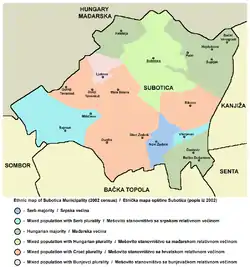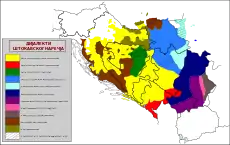Bunjevac dialect
The Bunjevac dialect (bunjevački govor or bunjevački jezik,[2] "Bunjevac language") is a Shtokavian–Western Ikavian dialect used by members of the Bunjevci community. The speakers live in parts of the autonomous province of Vojvodina in Serbia as well as in southern parts of Hungary. The accent is purely Ikavian, with /i/ for the Common Slavic vowels jat. Its speakers largely use the Latin alphabet, as is illustrated in their locally published newspaper. In Serbia, it is officially recognized as a standardized minority language since 2018.
| Bunjevac | |
|---|---|
| bunjevački | |
| Native to | Serbia (Vojvodina), Hungary |
Native speakers | 6,800 (2011)[1] |
Indo-European
| |
| Language codes | |
| ISO 639-3 | – |
| Glottolog | None |
| South Slavic languages and dialects |
|---|
Number of speakers
In the 2002 census results published by the Statistical Office of Serbia, Bunjevac was not listed among main languages spoken in Serbia, but those that declared that their language is Bunjevac were listed in category "other languages". For example, in the municipality of Subotica, the number of those listed as speaking "other languages" (presumably Bunjevac) was 8,914.[3]
According 2011 census, 6,835 people declared Bunjevac as their native language and it was listed independently.[1]
Status
The status of the Bunjevac is vague, and it is considered a dialect of Serbo-Croatian by linguists. According to the 2002 census in Serbia, some members of the Bunjevac ethnic community declared that their native language to be Serbian or Croatian. This does not mean that they do not use this specific dialect, but merely that they do not consider it sufficiently distinct from the aforementioned standard languages to register as speakers of a separate language. However, those Bunjevci who declared Bunjevac to be their native language consider it a separate language.
The Bunjevac language has been officially standardized in Serbia in 2018[4] and was approved by the Ministry of Education for learning in schools in 2020.[5]
History
In the old Austro-Hungarian censuses (for example one from 1910), Bunjevac was declared as a native language of numerous citizens (for example in the city of Subotica 33,247 people declared Bunjevac as their native language in 1910). During the existence of the Kingdom of Yugoslavia and the Socialist Federal Republic of Yugoslavia, members of the Bunjevac ethnic community mostly declared themselves as speaking Serbo-Croatian.
Today, there is wish among the Bunjevac ethnic community for affirmation of their dialect / language. The Bunjevačke novine is a Bunjevac language monthly newspaper published in Subotica. The Radio Television of Vojvodina broadcasts TV programme ("Spektar" TV magazine) in Bunjevac. There are also demands for school classes in Bunjevac.
 Ethnic map of the Municipality of Subotica showing villages with Bunjevac majority, including both, Bunjevci who declared themselves as Croats and Bunjevci who declared themselves as Bunjevci.
Ethnic map of the Municipality of Subotica showing villages with Bunjevac majority, including both, Bunjevci who declared themselves as Croats and Bunjevci who declared themselves as Bunjevci. Shtokavian dialects.
Shtokavian dialects.
Notes
- "2011 Census of Population: Religion, mother toungue and ethnicity" (PDF). Statistical Office of the Republic of Serbia. 2013. Archived from the original (PDF) on 2014-07-15.
- http://www.blic.rs/Vesti/Vojvodina/17383/Bunjevacki-jezik-u-skolskom-programu
- "Archived copy" (PDF). Archived from the original (PDF) on 2010-11-13. Retrieved 2009-02-20.CS1 maint: archived copy as title (link)
- Decision of the National Council of Bunjevci no. 18/2018-192